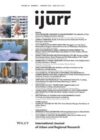This article examines gentrification as a racialized process of urban redevelopment by exploring the case of Boyle Heights, a historically working-class Mexican American barrio in Los Angeles. Through ethnographic fieldwork and archival data, the analysis shows how gentrification builds upon racial capitalism and gives rise to insurgent anti-gentrification activism. This article centers the emergence of the radical coalition, Defend Boyle Heights (DBH), examining how it reframed gentrification and redefined the terms of debate over redevelopment in the barrio. DBH wielded their conceptualization of ‘hood solidarity to challenge liberal narratives positioning gentrification as an inevitable process towards urban progress. By directly confronting landlords, developers, nonprofits and others implicated in neoliberal redevelopment, DBH disrupted mainstream, market-driven logics and articulated an alternative vision of urban planning and community organizing. Their use of militant direct action sought to connect local struggles in Boyle Heights with parallel fights in other racialized urban spaces. The militancy and alliance-building of DBH exemplify how place-based activism can challenge dominant urban narratives and expose the structural inequalities fueling modern development. DBH’s actions and discourse demonstrate that gentrification is not merely a market phenomenon but an ongoing racialized process, highlighting the power of radical solidarity in reimagining urban futures.
Details
Written by:
Ashley C. Hernandez
Digital Object Identifier (DOI)
https://doi.org/10.1111/1468-2427.70006
About DOI
